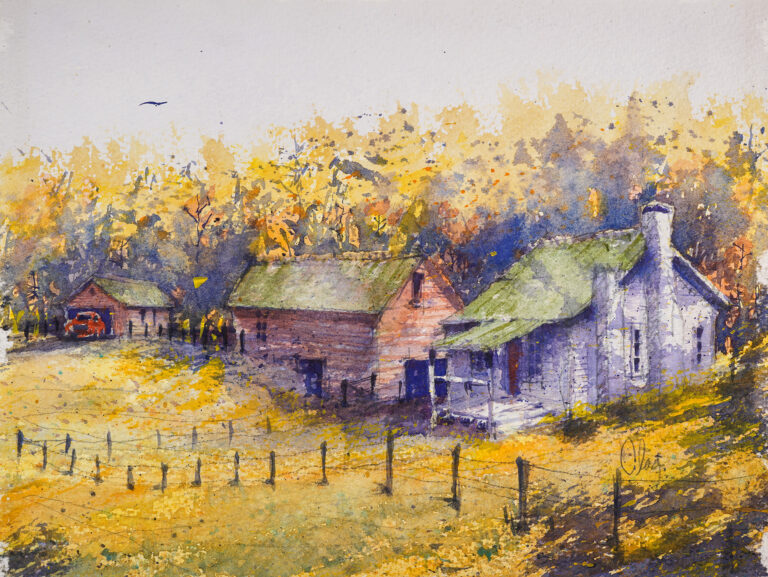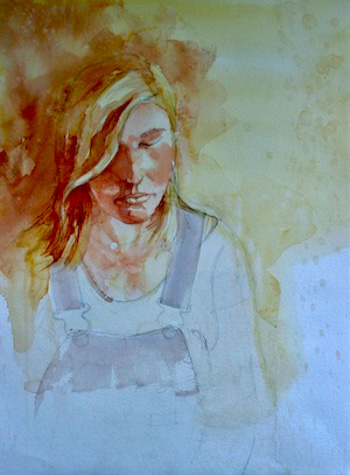Introduction to Essential Helder

“Telling a story is like reaching into a granary full of wheat and drawing out a handful. There is always more to tell than can be told. As almost any barber can testify, there is also more than needs to be told and more than anybody wants to hear.”
—Wendell Berry, Jayber Crow
“The most important discovery of my whole life is that one can take a little rough cabin and transform it into a palace just by flooding it with God.”
― Brother Lawrence
This is a work of fiction and a collection of conversations between Helder and me, mostly at his cabin in the deep woods. It includes Helder’s stories, some of my own stories, and emails and texts he occasionally wrote to me when he thought a more detailed explanation was helpful. I have included some of Helder’s paintings and photos with the text because I have enjoyed them and because he has been generous with them. My hope is that you will enjoy them also. I have written these things for the sole enjoyment of those who knew Helder, at least a little, his friends and his family. Few knew him well, as I did; not even those closest to him. He was a most modest man; not given to speaking openly about his practice of the presence. As he said to me, “Lovers don’t kiss and tell.”
I, Passerby, imagined the characters. Helder gave me my name, Passerby (Helder often calls me Pass), which comes from the Gospel of Thomas, saying 42. I bestowed the name Helder. This simply means a spiritual elder who is male.  Helder gave Claire her name in memory of the times she sometimes thought it should have been her name and would have been the name of their daughter had they birthed one. Also, Claire was the companion of Francis of Assisi, from whose life stories Helder drew strength and a sense of presence.
Helder gave Claire her name in memory of the times she sometimes thought it should have been her name and would have been the name of their daughter had they birthed one. Also, Claire was the companion of Francis of Assisi, from whose life stories Helder drew strength and a sense of presence.
• • •
I hope you find nothing new on these few pages. My felicity is that you may, and so then, be drawn to the “narrow way” of Love our Rabbi Jesus taught us. My conviction in offering these few pages of simple stories—drawn from a lifetime of wandering and wondering—is that they are solidly within the continuous stream of the ‘Great Perennial Wisdom tradition.’ While many have said I am unorthodox, I believe the exact opposite is true. Reality is never unorthodox.
Since before there was dirt, the Great Spirit has Loved and desired to be Loved in return by Her good Creation. Throughout human history, she has never acted transactionally, only relationally, and if your religion promises the favor of a deity in return for right behavior, adherence to an egregious moral code, or the shedding of blood, start asking questions.
Most kinds of Her creatures have no choice but to Love. She created them that way. Only the human-kind may choose to receive or refuse Her Love without prejudice on Her part. It is the way of all Love that we must choose it or not. She is all of the Love there is. We often refuse Her Love, even though to know Her love is the deepest desire of every human heart.
• • •
There are over 150 Hebrew names for God in the Hebrew Bible, most translated as God or Lord in English. Seven of those names are generally considered the most holy by the Jews, and the rest are attributes; very helpful descriptions.
I find insufficient personal pronouns in English for the Great Spirit, so I have turned to metaphors and some personal pronouns. You may notice that I have avoided using the general term, God. All religious traditions use the word to refer to a deity, most of human origin, which is not helpful to this story when I mean only the one Jesus called Father. The Father of Jesus is the Universal Creator Spirit, Elohim, who birthed all things into being, no matter the name you give Her.
In deflecting a higher opinion of himself than he warranted or desired, the Buddha said, “I am only a finger pointing at the moon.” In a similar fashion, Jesus always pointed to his Father and invited his friends to do the same. Jesus was not the moon. His most common reference to himself was “the son of a man.” Which is also to say, the son of a mother.
• • •
I hope my preference to refer to the Father of Jesus as Her or She or they, them, or their (as in, “Let us create the human-kind in our image…”) instead of He or Him is not overly alarming. I intend to provoke if you are in need of it, but I mean you no harm. I am not saying that I believe the Spirit is a she. I am only denying patriarchy its presumption. Obviously, the Holy Spirit, or Ruach Elohim, is not a human with anatomy to match. As Jesus pointed out, his Father is Spirit or Ruach.
As a guide to spiritual seekers for the last three decades, I also need to say that in my experience, human females much more resemble the Creator Spirit I Love, who birthed all creation and the entire cosmos into being, than do human males whose penchant since the agricultural revolution, is for domination. Following Jesus was never about a contest, conquest, or power, which patriarchy is inclined to practice. Sorry, guys, but I have met few men who bear the yearning for or the receptivity to Her Love that women more naturally seem to do. The irresponsibility for this reality falls on the culture into which women have birthed men. Ultimately, a culture that will not introduce men to their calling as Her Lovers cannot.
“…If this consciousness I’m describing [Spirit] is gendered (and I think it is), it is clearly feminine. In neglecting the voices of women, who are more attuned to the immanent nature of divinity, who feel that eruption in their very bodies, theology has silenced a powerful —perhaps the most powerful—side of God.”
—Christian Wiman, My Bright Abyss
I completely agree with Christian’s sentiment, but not exactly with his conclusion about the gender of ‘God.’ The Father of Jesus, as revealed by Jesus, is more like my experience of the sacred Feminine —vulnerable, sacrificial, patient, strong, restorative, and void of need to overpower or consume—however stereotypical that may seem—than the male is—domineering and incontrovertible. My experience of Her Prophet Jesus, as Fr Richard noted, is “a feminine Spirit in a male body.” Perfectly balanced.
The Great Spirit is not feminine. Nor is She gender neutral, but gender inclusive. “Male and Female, She created them”—in Her image (Gen 1). Both, In equal measure and gravity, were required to incarnate Herself in creation—Both to make Her image. Repress one or the other, and we diminish ourselves, and we are no longer….’Us’.
To be fair, I have met few men or women who have taken our universally created purpose seriously—to be the Lovers of and for Her. And nothing good happens until someone converts—male or female—to the universal Love of the Father of Jesus, the Father of every human ever born.
You will perhaps notice the abundance of quotes from Brother Lawrence, the Practice of the Presence of God.
(Brother Lawrence (1611–1691) was a lay brother in a Carmelite monastery, where he primarily worked in the kitchen. His reflections, known as ‘the Practice of the Presence of God’, have inspired many to simple practices of contemplation and presence.)
Like Odysseus finally returned home after a journey of falling and rising again over many years, I returned to ‘the Practice,’ the first place where I learned of Her ever-present Love for me, and I discovered that only I have changed. I left home, and She went with; I returned to my home to find Her waiting.
Another oft-quoted figure here is Fr Richard Rohr. I have never met him, but have read most of his writings. Clearly Prophetic and exceptionally anointed by Her Spirit of wisdom, I recommend you read all his work.
I have quite intentionally written with as few words as possible. My object is to be clear, not impressive (I would have great difficulty being impressive anyway). The good news of Her Love for us delivered by Her servant Jesus is not complicated; it is simple, for children. But, in its effort to justify its edifice and its blatant consumption of Her good gift to us, religion has encrusted the good news with many words that, to most, mean little and serve only to codify our need for a priest class to interpret their religious words. I wish I did not need to speak so, but that others might hear and then see (Matthew 13:15); I guess I will add my voice in the company of strangers.
Rabbi Jesus exhorted us,
“Take my yoke and put it on you, and learn from me, because I am gentle and humble in spirit; and you will find rest.”
When I introduce a • • • symbol into this text, it is an invitation and my hope that you will take a moment to listen.
—Passerby (Pass)